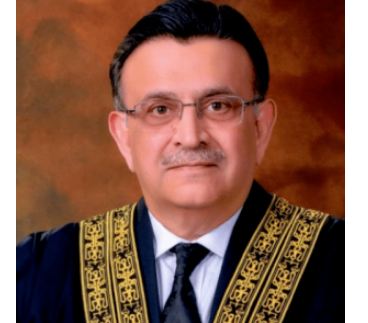ISLAMABAD: Chief Justice of Pakistan (CJP) Umar Ata Bandial on Tuesday observed that by enacting the Supreme Court (Review of Judgements and Orders) Act 2023, the government had equated the right to appeal with the review against court orders, thus obliterating the distinction created by the Constitution.
The observation came during the hearing by a three-judge SC bench of a set of challenges to the law as well as Election Commission of Pakistan’s (ECP) review against the April 4 verdict fixing May 14 as the date for holding elections to the Punjab Assembly.
At the outset of the hearing, the CJP observed that the apex court would like to know the depth of the petitions moved to challenge the law, though the review petition will remain pending during the hearing of the pleas.
The court, however, turned down a request for staying the operation of the law like it did earlier while taking up the case against the Supreme Court (Practice and Procedure) Act 2023, since both laws have overlapping features.
Turns down request to stay operation of SC (Review of Judgements and Orders) Act
“You are assuming that we would like to stay the law one after another; this is not possible,” the CJP observed while pointing towards petitioners Ghulam Mohiuddin and Zaman Khan Vardag, who were attending the proceedings from Karachi and Lahore, respectively, via video link.
Justice Ijaz-ul-Ahsan observed that the effect of both the laws was that they had provided an appeal under the garb of the review and if the appeal was decided, a further appeal in the name of the review was still available.
The judge asked the counsel to convince the court what intent and purpose were in the minds of the framers of the Constitution and the trappings of the review to give the case a finality and what prevented the legislators from providing a second appeal to the judgements of the apex court.
Barrister Syed Ali Zafar, representing PTI Secretary General Omar Ayub Khan, argued that the law was against the Constitution, adding that in fact the government had actually amended Article 188 that deals with the review jurisdiction through a simple law when it required a constitutional amendment. They have provided a new court within the Supreme Court and that too through an ordinary law, he said.
The counsel argued that the Constitution did not contemplate appeal on the judgements of the Supreme Court, adding that when the framers of the Constitution envisaged the concept of review by inserting Article 188 into the Constitution, they intended to give the concept of finality in cases.
“That was the reason they provided a limited jurisdiction to the Supreme Court while dealing with the review matters to be used on exceptional matters during the hearing of which no fresh appraisal of the facts was allowed or rehearing of the matter was possible. The review jurisdiction is not an appellate jurisdiction and had the Constitution makers intended to provide the right to appeal to the top court, they could have done so earlier,” he argued.
The counsel recalled how a full court consisting of heavyweight judges like Justices Anwar-ul-Haq, Dorab Patel, Afzal Zullah, Nasim Hassan Shah, and many others, the acumen of those and their knowledge of law cannot be doubted, developed the Supreme Court Rules by giving Order 26 which specifically dealt with the review jurisdiction of the apex court.
These judges, while formulating the rules, were absolutely clear what they meant with the review jurisdiction, he said, adding that the provision was not a curtailment of the jurisdiction of the court.
Earlier, Ghulam Mohiuddin and Zaman Khan Vardag pleaded before the court that since the vires of the two laws were almost the same, the same eight-judge SC bench, which was hearing the practice and procedure act, should hear the matter.
The court will take up the case again on Wednesday.

















